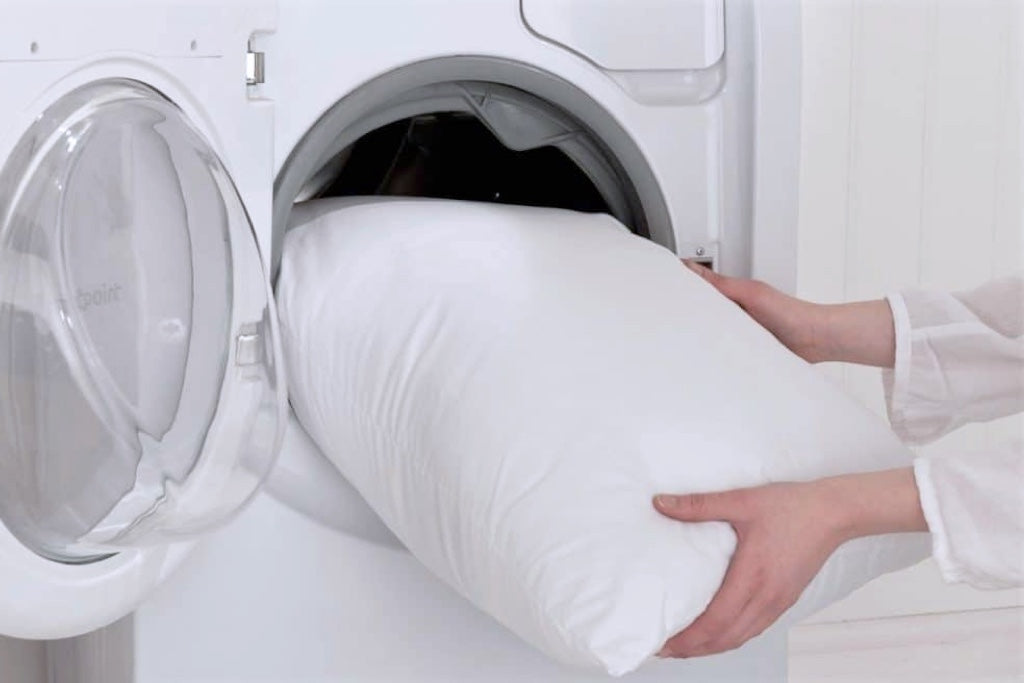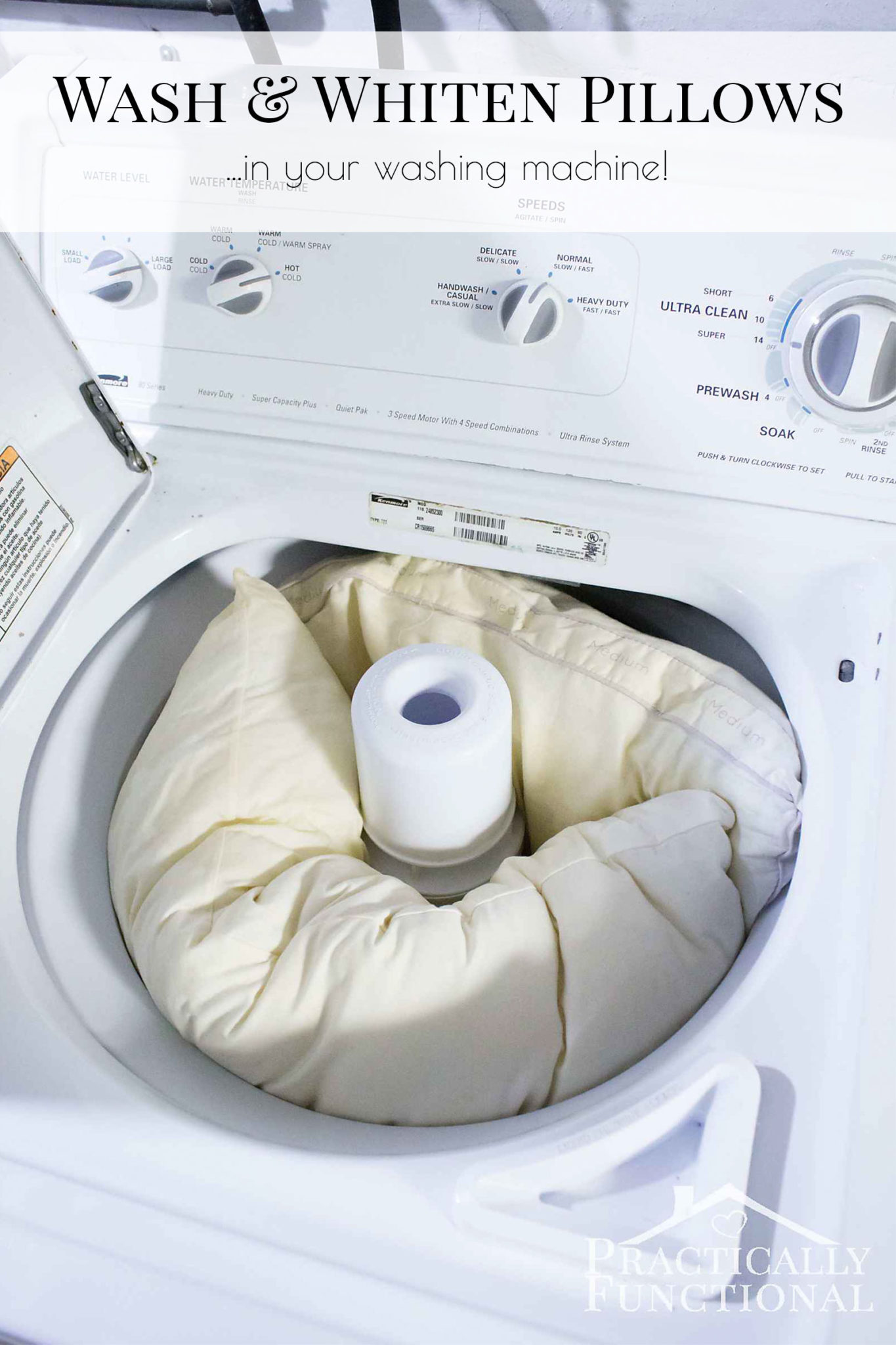Yes, you can wash most pillows in the washing machine. Always check the care label for specific washing instructions.
Pillows accumulate dust mites, allergens, and sweat over time. Regular cleaning keeps them fresh and extends their lifespan. Washing pillows in the machine is often convenient, but not all types are suitable for this method. Synthetic and cotton pillows generally withstand machine washing well, while memory foam and certain down pillows require special care.
It’s crucial to maintain the right washing settings and use gentle detergents to avoid damage. Remember to dry them thoroughly to prevent mold growth. Knowing how to properly wash pillows can help create a healthier sleeping environment. Keep your pillows clean for a more restful night’s sleep.
Introduction To Washing Pillows
Washing pillows is essential for a healthy sleep environment. Dust mites, sweat, and allergens build up over time. Regular cleaning keeps pillows fresh and supports better sleep quality.
The Importance Of Clean Bedding
Clean bedding promotes good health. Here are the key reasons:
- Reduces Allergens: Removes dust mites and pollen.
- Improves Air Quality: Keeps your bedroom environment fresh.
- Prevents Odors: Eliminates musty smells from sweat and oils.
- Enhances Comfort: Fresh pillows feel better and support sleep.
Regularly washing pillows contributes to a cleaner sleeping space.
Myths About Washing Pillows
Many myths surround washing pillows. Let’s clarify some common misconceptions:
| Myth | Fact |
|---|---|
| Pillows cannot be washed in a machine. | Most pillows are machine washable. |
| Washing pillows ruins them. | Proper washing maintains pillow quality. |
| Only pillowcases need washing. | Pillows also collect dirt and germs. |
| Dry cleaning is the only option. | Home washing is usually safe and effective. |
Clearing these myths helps maintain pillow hygiene.

Credit: puffy.com
Types Of Pillows And Washability
Understanding pillow types is essential for proper care. Not all pillows can be washed in a machine. Each type has unique materials, affecting washability. Here’s a breakdown of common pillow types.
Feather And Down Pillows
Feather and down pillows are soft and luxurious. They provide excellent support and comfort. Washing these pillows is possible, but care is needed.
- Check the care label for specific instructions.
- Use a gentle cycle with cold water.
- Include a few tennis balls in the dryer to fluff them.
Memory Foam And Latex Pillows
Memory foam and latex pillows offer great support. They mold to your head and neck. Washing these types is tricky.
Do not wash them in a machine. Instead, spot clean with a damp cloth. Use a mild detergent if necessary. Allow them to air dry completely.
Synthetic Fiber Pillows
Synthetic fiber pillows are affordable and hypoallergenic. They are often machine washable, making them easy to clean.
| Washability | Drying Method |
|---|---|
| Machine washable | Tumble dry on low heat |
Follow these tips:
- Use a gentle cycle with warm water.
- Do not overload the machine.
- Check for any specific care instructions.
Pre-wash Pillow Care
Before washing pillows, proper care is essential. Cleaning them correctly can improve their lifespan. Follow these steps to prepare your pillows for washing.
Checking Care Labels
Always start by checking the care label on your pillows. The label provides important washing instructions. Here’s what to look for:
- Washing Method: Look for machine or hand wash.
- Temperature: Check for the recommended water temperature.
- Drying Instructions: Note any specific drying methods.
Ignoring these instructions can damage your pillows. Pay close attention to the materials used. Some pillows may not be machine washable.
Pillow Stain Removal Tips
Stains can make pillows look dirty. Treat stains before washing to ensure cleanliness. Follow these simple tips:
- Identify the Stain: Determine what caused the stain.
- Use a Stain Remover: Apply a gentle stain remover directly.
- Blot, Don’t Rub: Blot the stain with a clean cloth.
- Test on a Small Area: Always test the remover on a hidden spot.
For tough stains, consider using a mixture of vinegar and baking soda. This natural solution works well on many types of stains.
Prepare your pillows carefully. This ensures they come out clean and fresh.

Credit: www.wikihow.com
Machine Washing Guide
Washing pillows in a machine can be easy. Follow this guide for the best results. Keep your pillows fresh and clean with the right steps.
Selecting The Right Detergent
Choose a gentle detergent for washing your pillows. Harsh chemicals may damage the fabric. Look for options labeled as:
- Hypoallergenic
- Free from dyes
- Unscented
These types help avoid irritation. Use the recommended amount to prevent residue buildup.
Setting The Washing Machine
Set your washing machine correctly. Follow these steps:
- Use a large capacity washer for bulky pillows.
- Choose a gentle cycle. This protects the pillow’s shape.
- Set the water temperature to warm. Hot water can damage some materials.
- Rinse thoroughly to remove all soap.
Check the care label on your pillows. Some materials may need special settings.
Balancing The Load
Balancing your washing machine is crucial. An unbalanced load can cause issues. Here’s how to balance:
| Load Type | Action |
|---|---|
| 1 Pillow | Add 1-2 towels for balance. |
| 2 Pillows | Wash them together to balance weight. |
| More than 2 Pillows | Split into multiple loads if needed. |
Ensure the load is even. This helps the machine run smoothly.
Hand Washing Techniques
Washing pillows by hand is a safe alternative to machine washing. This method prevents damage and maintains the pillow’s shape. Proper hand washing techniques ensure a thorough clean without harming the fabric.
Steps For Gentle Hand Cleaning
- Gather Supplies: You need mild detergent, warm water, and a clean basin.
- Fill the Basin: Use warm water to fill a large basin.
- Add Detergent: Mix in a small amount of mild detergent.
- Submerge the Pillow: Gently place the pillow into the soapy water.
- Agitate Gently: Use your hands to gently press and move the pillow.
- Rinse Thoroughly: Remove the pillow and rinse under cool, running water.
- Check for Soap Residue: Ensure no soap remains in the fabric.
Drying After Hand Washing
Drying pillows properly is essential for maintaining their structure. Follow these steps for effective drying:
- Remove Excess Water: Press the pillow gently to remove water.
- Use a Towel: Roll the pillow in a clean towel to soak up more moisture.
- Air Dry: Lay the pillow flat in a well-ventilated area.
- Fluff Regularly: Turn and fluff the pillow every few hours.
Never use direct heat to dry pillows. It can cause damage. Ensure the pillow is completely dry before using it again. This prevents mold and unpleasant odors.
Post-wash Pillow Maintenance
After washing pillows, proper maintenance ensures their longevity and comfort. Follow these steps to keep your pillows fresh and fluffy.
Proper Drying Methods
Drying pillows correctly is crucial. It prevents mold and retains their shape. Here are effective drying methods:
- Air Drying: Lay pillows flat in a sunny area.
- Tumble Drying: Use a low heat setting in the dryer.
- Use Dryer Balls: They help fluff pillows while drying.
Check pillows frequently during drying. Ensure they are completely dry before using. Damp pillows can develop a musty smell.
Fluffing Pillows After Washing
Fluffing pillows restores their shape. It also enhances comfort. Here are simple ways to fluff pillows:
- Shake Them Out: Hold the pillow by its edges and shake.
- Hit with Hands: Gently hit the pillow with your hands.
- Use a Pillow Fluffer: A specialized tool can help.
Fluff pillows regularly. This keeps them supportive and comfortable. A well-fluffed pillow can improve your sleep quality.
When To Replace Your Pillows
Knowing when to replace your pillows is crucial for good sleep. Old pillows can cause neck pain and allergies. Look for signs of wear and tear. Understanding pillow lifespan helps you make informed decisions.
Signs Of Pillow Deterioration
- Visible Stains: Yellow or brown spots indicate old sweat and oils.
- Loss of Shape: Pillows should bounce back. Flat pillows need replacing.
- Allergies: Increased sneezing or itching may signal dust mites.
- Odor: A musty smell suggests mold or bacteria growth.
- Neck Pain: Waking up with discomfort often means it’s time for a new pillow.
Lifespan Of Different Pillow Types
| Pillow Type | Lifespan (Years) |
|---|---|
| Memory Foam | 2-3 |
| Latex | 3-4 |
| Feather | 1-3 |
| Down | 3-5 |
| Polyester | 1-2 |
Replacing pillows at the right time improves sleep quality. Check your pillows regularly. Follow these tips for a healthier sleep environment.

Credit: www.practicallyfunctional.com
Frequently Asked Questions
Can All Pillows Be Washed In The Washing Machine?
Not all pillows are machine washable. Check the care label for specific washing instructions. Generally, polyester and cotton pillows are safe to wash. However, memory foam and latex pillows should not be machine washed. Hand washing or spot cleaning is recommended for these materials.
How Often Should You Wash Pillows?
You should wash your pillows every 3 to 6 months. This helps remove allergens and odors. Regular washing extends the life of your pillows. Always check the manufacturer’s instructions for specific guidelines. Keeping pillows clean contributes to better sleep quality and hygiene.
What Settings Should I Use To Wash Pillows?
Use a gentle cycle with cold or warm water. This helps protect the pillow’s material while effectively cleaning it. Avoid using hot water, as it can damage certain fabrics. Additionally, adding a couple of towels can help balance the load and prevent clumping.
Can You Dry Pillows In The Dryer?
Yes, you can dry most pillows in the dryer. Use a low heat setting to avoid damage. Adding dryer balls or clean tennis balls helps fluff the pillows. Make sure they are completely dry to prevent mold and mildew. Check the care label for specific drying instructions.
Conclusion
Washing pillows in the washing machine can be a simple and effective way to keep them fresh. Always check the care labels for specific instructions. Use gentle cycles and appropriate detergents for the best results. Regular cleaning can enhance your sleep quality and extend your pillow’s lifespan.
Enjoy a cleaner, healthier sleep environment!
